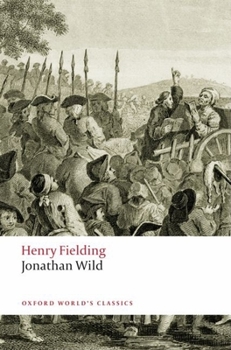The Life of Mr Jonathan Wild the Great
Select Format
Select Condition 
Book Overview
The real-life Jonathan Wild, gangland godfather and self-styled "Thieftaker General", controlled much of the London underworld until he was executed for his crimes in 1725. Even during his lifetime his achievements attracted attention; after his death balladeers sang of his exploits, and satirists made connections between his success and the triumph of corruption in high places. Fielding built on these narratives to produce one of the greatest sustained...
Format:Paperback
Language:English
ISBN:0199549753
ISBN13:9780199549757
Release Date:September 2008
Publisher:Oxford University Press
Length:352 Pages
Weight:0.05 lbs.
Dimensions:0.8" x 5.0" x 7.6"
Customer Reviews
2 ratings
What a wolf is in a sheepfold, a great man is in society
Published by Thriftbooks.com User , 18 years ago
For Henry Fielding, 'great men', like Alexander the Great and Julius Caesar, and 'great rogues', like Jonathan Wild, are synonymous terms. Greatness consists in bringing all manners of mischief on mankind. Alexander the Great overran a whole empire with fire and sword, pillaging, sacking, burning, enslaving and destroying millions of his fellow creatures. Julius Caesar abolished the republican liberties of his country in order to take the power into his own hands. At the opposite side of the spectrum, Jonathan Wild was a great prig (pick-pocket), cheating the very tools who were his instruments to cheat others: 'I had rather stand at the summit of a dunghill, than at the bottom of a hill in paradise.' For Henry Fielding, greatness rimes with ambition, lust, avarice, rapaciousness, hypocrisy, power, pride, insolence, insatiability, 'a privilege to kill, a strong temptation to do bravely ill'. Greatness is 'playing with the passions of men, to work one's own purposes out of the jealousies and apprehensions to create those great arts which the vulgar call treachery, dissembling, promising, lying, falshood, summed up in the collective name of POLLITRICKS.' And all that for what? Not for the general good of society, but for the power and the glory of the great man himself, for the satisfaction of his vices. The fact that 'he is hated and detested by all mankind makes him inwardly satisfied. Otherwise, why should he stand at the head of a multitude of prigs, called an army, in order to molest his neighbours, to introduce rape, rapine, bloodshed and every kind of misery on his own species, to desire maliciously to rob those subjects, to reduce them to an absolute dependence on his own will, to betray the interest of his fellow-subjects, of his brethren.' Jonathan Wild: 'I ought rather weep with Alexander, that I have ruined not more.' Another target of the author are the hypocritical priests: 'Life is sweet, I had rather live to eternity ... so many wallow in wealth and preferment.' He insults the ordinary, who attends to the spiritual needs of condemned criminals; 'You are more unmerciful to me than the Judge.' Henry Fielding's forceful diatribe against all conquerers, tyrants, pollitrickers, and vicious 'prigs' still sounds extremely modern. He blames the majority of mankind to continue to praise the said great men. But, 'there are still some, who view these great men with a malignant eye and dare affirm that these great men are always the most pernicious and generally the most wretched and truly contemptible of all works of creation.' This book is a ferocious and, unfortunately, still very topical satire. A must read.
Neglected morality tale of exquisite language
Published by Thriftbooks.com User , 23 years ago
Henry Fielding's novel Jonathan Wild - out of print since 1982? Bummer. Jonathan Wild was a real organizer of a group of thieves (i.e., prigs), but Fielding invented considerable portions of this novel. Enraged by the acclaim given to dishones but "great" men (that is, men who had achieved success for their benefit, while often doing harm to others), Fielding set out to chronicle, in the most flowery and euphemistic terms possible, the life and times of Jonathan Wild, Esq. As a foil, Thomas Heartfree, who is nearly ruined by Wild, is introduced. As characters, they are stick figures, but that is intentional. Fielding sets to battle ridiculous extremes of good and evil, with good emerging triumphant in the end.It might emerge as a tedious harangue on the virtues of a good life, but Fielding's skill as a writer makes this impossible. His elaborate sentences demand close attention, and their rewards are great. Intricate and well thought-out, they are fascinating in and of themselves. The story is witty, well-balanced, and constantly amusing. The morality and writing of the story have aged well, the former largely because of the latter, and Jonathan Wild is a quite good, though most likely minor, narrative of infamy and saintliness.






